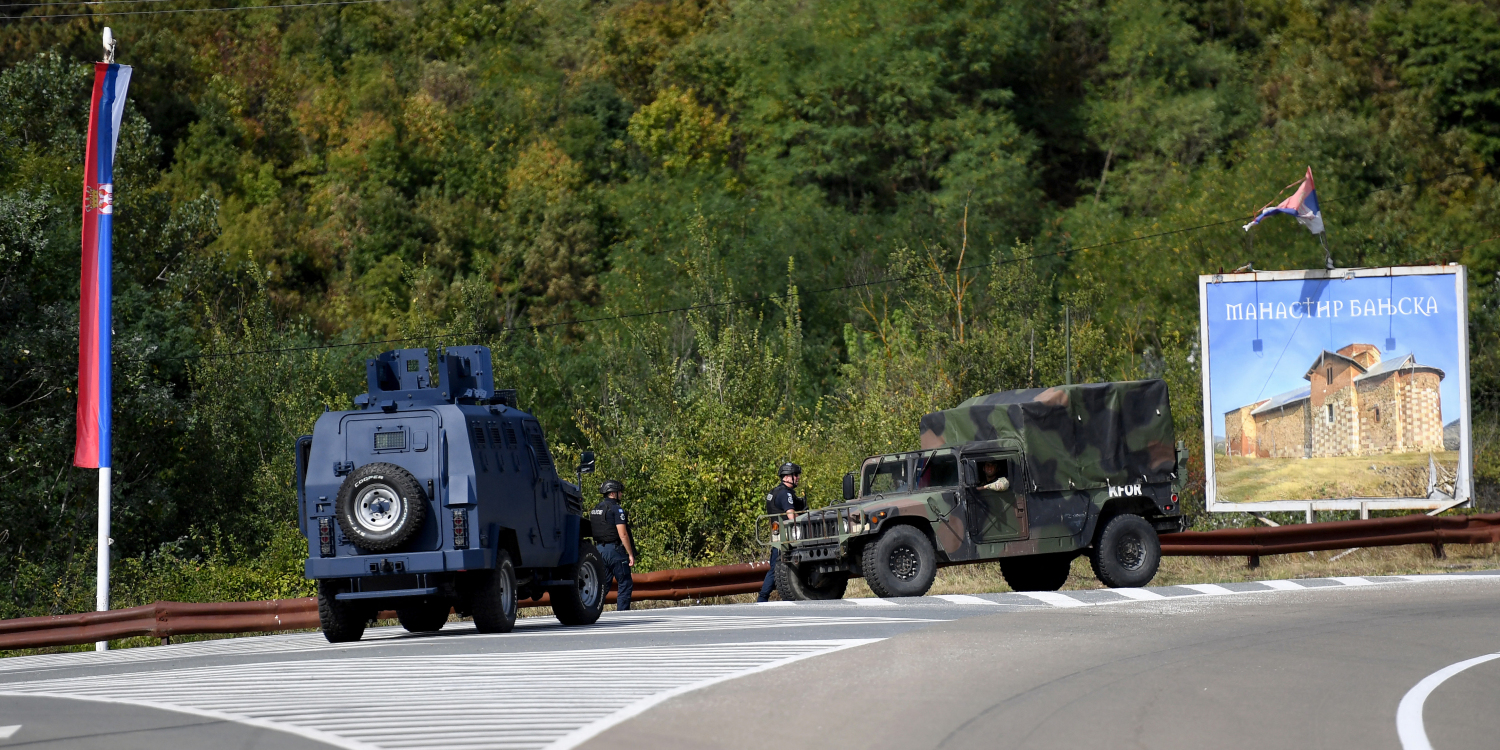Europe 1 with AFP // Photo credit: STRINGER / AFP 14:26 p.m., September 24, 2023
The situation in northern Kosovo was chaotic on Sunday morning. Heavily armed men exchanged fire, killing a policeman before holing up in a monastery where pilgrims are staying. According to Prime Minister Albin Kurti, there are at least "30 professionals, soldiers or armed police".Armed men holed up in a monastery, heavy weapons fired at police, a policeman killed: the situation in northern Kosovo was chaotic on Sunday, with authorities in Pristina blaming "organised crime supported by officials in Belgrade". "There are at least 30 professionals, soldiers or armed police, who are currently surrounded by our police forces and whom I invite to surrender," Prime Minister Albin Kurti told reporters, showing images of armed men in the courtyard of a monastery.
"They are not civilians, but professionals"
"These are not civilians," he said, "but professionals, police or military, who are in and around a monastery," in which there are pilgrims, according to the diocese. "According to the latest information, masked men stormed the Banjska monastery in an armored vehicle, and forced the door. There is currently a group of pilgrims from Novi Sad, Serbia, with an abbot," the diocese said in a statement. For their safety, they locked themselves inside, and "armed men move in the courtyard, where gunshots can be heard."
>> READ ALSO - NATO announces additional forces after clashes in Kosovo
A local police official confirmed to AFP that the exchange of fire was continuing: "You can see armed men in uniform. They shoot at us and we retaliate." The violence has continued since the death early Sunday of a Kosovar policeman killed while patrolling near the border with Serbia. He was on his way to a road marked as blocked when his unit "was attacked from different positions with heavy weapons, including grenades," according to police. One of his colleagues was wounded in the attack.
Albin Kurti immediately denounced a "criminal and terrorist" attack, and accused "Belgrade officials" of offering logistical and financial support "to organized crime". "This is an attack on Kosovo," said President Vjosa Osmani. "These attacks prove if it were still necessary the destabilizing power of criminal gangs, organized by Serbia, which have been destabilizing Kosovo and the region for a long time," she wrote in a statement, calling on Kosovo's allies to support the country "in its efforts to establish peace and order and preserve sovereignty over the entire Republic of Kosovo."
Recurrent unrest in the region since the war
Since a conflict that left 13,000 dead, mostly Kosovar Albanians, relations between the two former enemies have gone from crisis to crisis. Serbia, supported in particular by its Russian and Chinese allies, refuses to recognise the independence of its former province, whose population of 1.8 million, mostly of Albanian origin, includes a Serb community of about 120,000 people, who live mainly in northern Kosovo.
>> LISTENING - War crimes trials in The Hague: settling scores in Kosovo, before Ukraine
This region is thus the scene of recurrent unrest: tension rose sharply in May when the Kosovar authorities decided to appoint Albanian mayors in four municipalities with a Serb majority. The move triggered one of the worst episodes in the history of tensions in the north of the country in years, with protests, the arrest of three Kosovar policemen by Serbia and a violent riot of Serb protesters that left more than 30 NATO peacekeepers injured.
The international community has repeatedly urged both sides to de-escalate, and stressed that Belgrade and Pristina's accession to the European Union could be jeopardized by these renewed violence. But ten days ago, the last attempts at talks between the Prime Minister of Kosovo, Albin Kurti, and the Serbian President, Aleksandar Vucic, failed after just a few hours.
The Serbian side wants to obtain some form of association of Serb communities in the north as a prerequisite for any discussion, while the Kosovo side has as a prerequisite Belgrade's recognition of Kosovo's independence.

